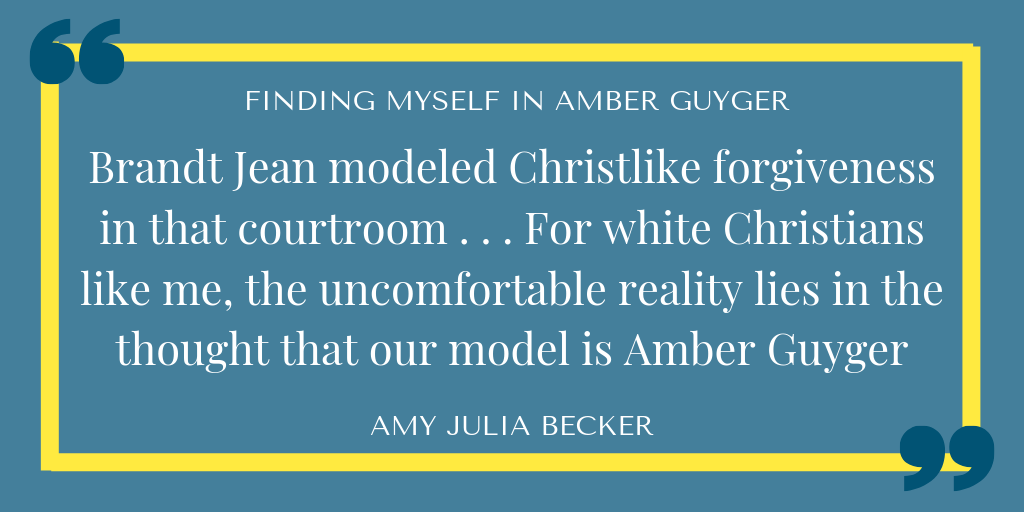Botham Jean was an unarmed black man sitting in his home when Amber Guyger, a white former police officer, shot him. In her trial, Guyger claimed that she had accidentally entered the wrong apartment and thought Jean was an intruder. The jury found Guyger guilty of murder. She was sentenced to ten years in prison.
For the past week, my social media feeds and news sources have reported on the verdict of this case. But I’ve also read about the judge, a black woman named Tammy Kemp, giving Guyger a hug and a Bible, after Guyger requested them both. And what has been shared most of all has been a viral video of Jean’s brother Brandt hugging Guyger and saying, “I forgive you. And, I know if you go to God and ask him, he will forgive you.”
But the center of this story, especially for white people, is not forgiveness. The center is guilt.
Not a Feel-Good Story
As many people of color have noted, white Christians like me can easily make this into a feel-good story about grace and forgiveness rather than reckoning with the inequities within our justice system, the implicit bias that many people (white people and people of color, including police officers) hold against African Americans, and the deep pain and suffering such injustice has caused for generations.
We can easily make this a story about forgiveness, but the trial of Amber Guyger is first and foremost a story about guilt. For white people like me, it is engaging with that guilt that holds the possibility of healing.
Jemar Tisby, author of The Color of Compromise, wrote for the Washington Post about the problems of letting “the hug” become the message of this trial. Tisby writes, “A society built around white superiority is also built around white innocence — an assumption of the intrinsic moral virtue of all white people and the purity of their intentions regardless of impact. White innocence assumes black forgiveness.”
Amber Guyger was convicted of murdering her neighbor, an unarmed black man. When we turn our attention only to the gifts of compassion and grace she received, we turn our attention away from the painful reality of her actions and their consequences. When we focus on the beauty of forgiveness, we neglect to ask the question of what caused the pain.
What if?
What if most white people are more similar to Amber Guyger than we would like to admit? What if we are complicit participants in thoughts and actions with devastating consequences to individuals, families, and communities? And what if we, like Guyger, were forced to reckon with that complicity and that participation? What if we found ourselves pronounced guilty?
In that case, a viral video of a young black man forgiving his brother’s murderer might strike us with a different kind of force, a different kind of need. Not the need to tie up a terrible story with a shiny bow of redemption, but the need for utterly unmerited favor. We might begin to long for, but not expect, the gift of undeserved human connection and compassion. We might begin to participate in undoing years of injustice and harm.
A Different Society
If white superiority is predicated upon white innocence, then a starting point for a different society would be an understanding of our common humanity. That none of us are innocent. That none of us are outcast. That all of us are limited, broken, and beloved.
In White Picket Fences, I wrote in the introduction, “Most of the time, being white and affluent and educated puts me in a position of strength, but in looking for ways that our culture might heal, I find myself in a position of weakness. The only way healing can happen is if the people who have been excluded and marginalized are willing to forgive and trust people like me.”
Brandt Jean did model Christlike forgiveness in that courtroom, and Judge Tammy Kemp modeled compassion, hope, and the possibility for reconciliation. For white Christians like me, the uncomfortable reality lies in the thought that our model is Amber Guyger, a person who has been found guilty, a person who is in need of forgiveness, a person who seems to be acknowledging her own brokenness, a person who is ready for the deep, hard, healing work of grace.
If you haven’t already, please subscribe to my newsletter to receive regular updates and news. You can also follow me on Facebook, Instagram and Twitter.




